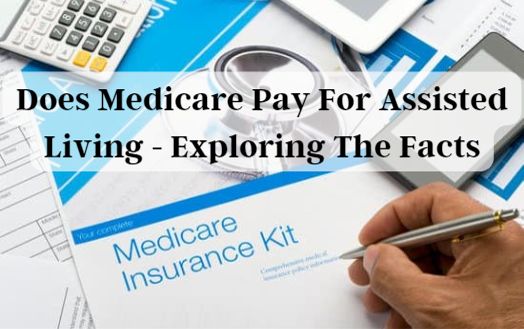Navigating the financial aspects of assisted living can be complex, especially when it comes to understanding what Medicare covers. As you approach retirement age or help a loved one plan for their future, it’s crucial to know which expenses you can expect to incur and how Medicare plays a role in covering those costs.
Medicare is an essential component of healthcare coverage for many seniors, but its application in the realm of assisted living may not be as extensive as you might hope. It’s important to note that Medicare does not generally cover long-term care like assisted living facilities. The scope of Medicare coverage primarily focuses on short-term stays in a Medicare-certified skilled nursing facility (SNF) for prescribed rehabilitation and specialized nursing care after a hospital stay.
With this in mind, it’s vital to explore other options for covering the costs of assisted living, such as long-term care insurance, personal savings, or government programs like Medicaid. Being well-informed about your options will ultimately empower you to make the best decisions for your future and your loved ones. Does Medicare pay for assisted living? Read on to know more about it.
Medicare And Assisted Living
Coverage Overview
Medicare, a federal health insurance program for individuals aged 65 and older, does not generally cover long-term care like assisted living. The reason is that most of the care provided in assisted living facilities is considered custodial care, which includes help with daily life tasks such as eating, bathing, and dressing. However, some assisted living costs may be covered by Medicare in specific situations.
Long-Term Care Services
While Medicare does not typically cover assisted living, it does cover short-term stays in a Medicare-certified skilled nursing facility (SNF) under certain conditions. These conditions include a doctor-prescribed rehabilitation center for specialized nursing care and rehab after a hospital stay, as explained by AARP.
Since Medicare coverage for assisted living is limited, it’s essential for you to explore other options to help pay for these services. As mentioned by Medicare.gov, you can discuss your long-term care choices with your family, doctor, or other healthcare providers to determine what kind of long-term care suits your needs.
Medicaid And Assisted Living

Joint Federal and State Program
Medicaid, a joint federal and state program, offers coverage for long-term care services, including assisted living and memory care. As an eligible participant, you can receive aid for personal care and homemaker assistance. Additionally, Medicaid may cover emergency response systems and skilled nursing in this setting for seniors who meet the eligibility requirements.
However, bear in mind that each state has its own set of rules and eligibility requirements. Some states offer Medicaid waivers that provide partial coverage for assisted living expenses. These waivers may have enrollment caps and long waiting lists, so it’s essential to research and understand your state’s specific policies.
In contrast, Medicare does not typically cover long-term care services such as room, board, and general treatment services for assisted living. This is because Medicare explicitly excludes “custodial care” from its coverage.
To maximize your benefits, familiarize yourself with the options and resources available through both Medicare and Medicaid. Understanding the distinctions and limitations of each program will allow you to make informed decisions about your long-term care needs.
What Medicare Covers

When it comes to assessing the extent of Medicare coverage for assisted living, it is essential to understand the various aspects it does and does not cover. Medicare provides different types of services, but certain restrictions apply when considering assisted living.
Firstly, Medicare can indeed cover some costs associated with skilled nursing care. This includes situations where you require temporary, short-term skilled nursing services after hospitalization. In such cases, Medicare may cover up to 100 days of skilled nursing care, as long as it is necessary and provided by a Medicare certified skilled nursing facility (SNF). However, it is important to note that this does not include the cost of the assisted living facility itself.
While staying at an assisted living facility, Medicare still covers necessary or preventive medical and health-related services that your doctor prescribes. These might include lab tests, x-rays, physical therapy, prescription medications, and other related services. However, these services are typically covered under Medicare Part B or Part D, not as part of the facility’s fees.
Unfortunately, Medicare does not cover expenses related to housekeeping services, meals, and personal care in assisted living facilities. These costs are considered non-medical expenses and are usually paid for through out-of-pocket payments or long-term care insurance. Often, seniors and their families ask the question, ‘Does Medicare pay for assisted living?’ only to be disappointed to learn that it does not typically cover these expenses.
To summarize, Medicare may cover some medical and health-related services while you reside in an assisted living facility but does not cover the actual cost of the facility itself or non-medical expenses. Remember to consult with your doctor and explore your Medicare plan to understand the full extent of coverage available to you, and consider alternative funding options for assisted living costs.
What Medicare Doesn’t Cover
When it comes to assisted living, it’s essential to understand that Medicare typically does not cover long-term care, such as residing in an assisted living community or nursing home. These facilities provide housing, custodial services like laundry, cooking, and managing medications, which are not considered medical care.
Custodial care, or non-medical care, is one aspect that Medicare coverage does not extend to. Unfortunately, this type of care is the primary service provided by assisted living communities and nursing homes. It involves help with everyday tasks, such as dressing, bathing, and using the restroom, also known as the “activities of daily living” (ADLs).
Though Medicare won’t cover assisted living or nursing home stays, it may cover some short-term stays in a Medicare-certified skilled nursing facility (SNF) after a qualifying hospital stay. An example of a covered stay would be a doctor-prescribed rehabilitation center for specialized nursing care and rehab after a hospital stay.
It is also important to note that some Medicare Advantage plans might offer limited coverage for long-term care services. These plans are an alternative to Original Medicare, and they may include additional benefits like dental, vision, and prescription drug coverage. However, the extent of coverage for assisted living or nursing home stays under Medicare Advantage plans can vary, so it is crucial to review your specific plan details.
In summary, Medicare does not typically cover assisted living or nursing home services, as those facilities primarily provide custodial care which is not considered medical care. Be sure to explore alternative options and examine additional insurance plans to help cover the costs of long-term care and assisted living facilities.
Options For Long-Term Care Coverage

As you explore your options for long-term care coverage, it is important to know that Medicare typically does not cover assisted living costs. However, there are several alternatives to consider that may help you afford long-term care facilities and services.
One option is to look into long-term care insurance. This type of insurance policy provides coverage specifically for long-term care needs, such as nursing homes, assisted living, and home care services. The benefits and costs depend on the policy you choose, so it’s vital to research and compare different plans carefully.
Medicare Advantage plans can offer extended benefits compared to traditional Medicare. While these plans still might not cover the costs of assisted living, they may provide additional support for services such as in-home care and adult day care centers. This could be beneficial for individuals seeking alternative long-term care options.
Medigap is another choice designed to supplement your original Medicare coverage. Medigap policies may offer some coverage for skilled nursing services, but like Medicare Advantage, they usually don’t cover assisted living expenses. Nonetheless, a Medigap policy can help with copayments and deductibles associated with quality medical care.
If you’re under 65 and not yet eligible for Medicare, consider exploring traditional health insurance options for long-term care. Some private health insurance plans may offer coverage for long-term care services. Your employer-based health insurance plan might have options available for you as well.
In summary, although Medicare doesn’t typically cover assisted living costs, you have a variety of options to explore:
- Long-term care insurance
- Medicare Advantage plans
- Medigap policies
- Traditional health insurance
Remember to research and compare different plans to find the best solution for your unique needs and situation.
Medicare Parts A, B, and C

When it comes to understanding whether Medicare pays for assisted living, it’s essential to grasp the different parts of Medicare and how they relate to coverage. Medicare consists of Part A, Part B, and Part C, each offering various types of coverage for beneficiaries.
Medicare Part A primarily covers inpatient care, hospice, and sometimes home health care. Unfortunately, Part A doesn’t cover the custodial services involved in assisted living, as it’s primarily focused on hospital and inpatient care. So, you can’t rely on Part A for your assisted living expenses. For more information on what Part A covers, check Healthline.
Medicare Part B is medical insurance that covers outpatient care, including doctor visits and preventive services. While Part B helps cover medical needs, it doesn’t directly support assisted living costs or non-medical personal care services. Nonetheless, Part B can play a vital role in covering the cost of medical supplies and prescription drugs for seniors in assisted living. Explore more about what Part B offers on Caring.com.
Medicare Part C, commonly referred to as Medicare Advantage, merges the coverage of Parts A and B and often includes additional benefits. These plans are offered through private insurers and may help cover some long-term care costs. Although Medicare Advantage plans don’t necessarily cover assisted living directly, they provide a more integrated approach to healthcare coverage that could potentially aid in managing long-term care expenses. To learn more, visit Humana.
In conclusion, while Medicare doesn’t directly cover assisted living costs, various services and options are available through different parts of Medicare to help cover essential medical care for seniors in assisted living communities. Carefully evaluate how each part of Medicare might benefit you in terms of healthcare coverage and outline a plan that fits your needs.
Long-Term Care Alternatives

If you’re exploring long-term care options beyond Medicare coverage for assisted living, there are various alternatives to consider that may better suit your needs and financial situation.
Home Health Care can provide medical and non-medical services directly in your home. This option allows you to maintain your independence and familiar surroundings while receiving care. Services can include skilled nursing, physical therapy, and assistance with daily activities. You’ll need to assess the level of care required and budget constraints to determine if home health care is a viable option for you.
Another alternative is Inpatient Hospital Stay care. While it’s typically reserved for patients requiring acute medical treatment, it can still provide short-term relief for you and your caregivers. Keep in mind that Medicare covers inpatient hospital stays, but it is meant for shorter-term solutions and not long-term care.
Respite Care offers temporary relief for the primary caregiver, allowing them to take a break while ensuring your ongoing needs are met. This service can be provided in various settings, including your own home, a nursing facility, or even an adult daycare center. Respite care services can be an effective way to maintain the wellbeing of both you and your caregiver.
In conclusion, understanding your alternative care options like home health care, inpatient hospital stay, and respite care is crucial when planning for your future long-term care needs. By evaluating each option and choosing the best fit for your circumstances, you can ensure you receive the care you need while maintaining the highest possible quality of life.
Costs And Out Of Pocket Expenses

When it comes to the cost of assisted living, it’s important to understand that Medicare does not cover the costs associated with residing in an assisted living community, also known as custodial care. You will need to plan for the financial responsibility of these expenses, as they can vary depending on factors such as the location, size, and provided services.
As a Medicare beneficiary, you’ll face certain costs like coinsurance and copayments, which are your share of the costs for medical services covered by Medicare. For example, if you receive inpatient hospital care, you may need to pay a daily coinsurance rate depending on the length of your stay. Outpatient services, such as doctor visits or rehabilitative therapies, may require copayments, which are fixed amounts you pay for each service.
It’s crucial to be aware of your out-of-pocket expenses when considering assisted living arrangements. While Medicare may cover some medical costs at these facilities, most of the daily care provided, such as help with bathing or dressing, is considered custodial care and not covered by Medicare. You may need to rely on personal savings, long-term care insurance, or other sources to cover these costs.
To help plan your payments, consider researching and comparing the costs of various assisted living facilities in your desired area. Also, take the time to explore the financial assistance options available, such as Medicaid, veterans benefits, or other state-funded programs that might help reduce the burden of these expenses.
In summary, it is crucial to comprehend the costs and out-of-pocket expenses related to assisted living and Medicare coverage. Being well-informed and prepared will help ensure that you can afford the care and services you need in an assisted living facility.
Additional Services And Amenities

When considering assisted living options, it’s essential to understand the additional services and amenities offered by these facilities, which may not be covered by Medicare. These services can significantly impact the quality of life and comfort for you or your loved one in an assisted living community.
Transportation is often an essential service provided by assisted living facilities. While Medicare may not cover the cost of transportation, many facilities offer transportation services to medical appointments, grocery stores, and recreational outings. It’s crucial to evaluate the transportation services provided by each facility and weigh their importance to you.
Dental and vision care are critical aspects of senior health. Although Medicare may not cover routine dental and eye care, many assisted living facilities offer dental and vision care services onsite. Look for a facility that provides these services or has relationships with local providers who cater to seniors when making your decision.
Laundry services can be a valuable amenity for seniors who may not have the ability or desire to perform laundry tasks on their own. Many assisted living communities offer laundry services as part of their package or for an additional fee. Be sure to inquire about this aspect of the community when researching facilities.
Assisted living facilities often provide various amenities to enhance the living experience for their residents. These may include recreational activities, enrichment programs, social events, and fitness centers. It’s essential to consider the importance of these amenities to you or your loved one when selecting an assisted living facility.
In summary, while Medicare may not cover all the costs associated with assisted living, it’s crucial to consider the additional services and amenities offered by these communities. By examining transportation, dental, vision, laundry, and other amenities, you’ll be better equipped to find an assisted living facility that meets your needs and preferences.
Eligibility And Enrollment

When determining if Medicare will pay for assisted living, it’s essential to understand the eligibility criteria and enrollment process. First, you should be aware that Medicare primarily covers hospital and medical insurance, with limited coverage for long-term care services, such as assisted living.
During the open enrollment period, you can choose a Medicare plan that best suits your needs. The open enrollment period occurs annually from October 15 to December 7. Make sure to enroll within this timeframe to avoid any penalties or delays in coverage.
If you have a qualifying hospital stay, Medicare Part A may cover short-term care in a skilled nursing facility (SNF). A qualifying stay means you have spent at least three consecutive days in the hospital as an inpatient. In such cases, Medicare will cover eligible SNF stays with the following copayments in 2023:
- $0 for days 1 to 20
- $200 a day for days 21 to 100
After 100 days, you become responsible for covering all SNF costs. It’s important to note that assisted living is different from skilled nursing care, and Medicare typically does not cover assisted living expenses.
For low-income individuals or those with certain disabilities, Medicare may cover some services provided within an assisted living facility, such as medical care or therapy. However, the housing and supportive services associated with assisted living are generally not covered.
If you opt for a Medicare Advantage (Part C) plan, you might have additional coverage for long-term care costs. These plans are offered through private insurers, and they include everything covered by Part A and Part B. Though each plan may differ, they can help cover some long-term care costs, but they do not typically cover the full cost of assisted living.
In summary, Medicare coverage for assisted living is limited. It’s crucial to evaluate your needs and explore other options, such as long-term care insurance or Medicaid, to ensure you have ample support and resources for your assisted living journey. Despite the common misconception, does Medicare pay for assisted living? The answer is generally no, it does not cover long-term care services of this type.
Veterans Benefits

When exploring payment options for assisted living, it’s essential to consider the benefits available to veterans through the Department of Veterans Affairs (VA). As a veteran, you may have access to various programs that can help cover the costs of senior living, including long-term care services.
One of the primary benefits offered by the VA is the VA pension. This pension program provides monthly payments to eligible veterans with financial need. The VA pension can be used to help cover the costs of assisted living and other long-term care services. To qualify, you need to meet specific service, age, and income requirements.
In addition to the VA pension, the VA also offers long-term care services like assisted living, residential care, or home health care. These services are available to veterans who meet eligibility requirements, which may include service-connected disability ratings and income thresholds. Depending on your eligibility, you may receive care in various settings such as VA nursing homes, assisted living centers, adult day health centers, or even your own home.
If you’re a veteran exploring health care options outside of the VA, you may also be eligible for Medicare benefits. Veterans who meet income thresholds can apply for Medicare coverage after turning 65. Some Medicare benefits can assist in paying for home health care services, though it’s important to note that Medicare does not typically cover the costs associated with residing in an assisted living community.
In summary, the Department of Veterans Affairs offers various programs and benefits to help veterans cover the costs of senior living and long-term care services. Ensure you explore all your options and eligibility requirements to make an informed decision about your assisted living needs.
Frequently Asked Questions
How Do You Pay For Assisted Living If You Have No Funds?
If you have no funds, you should explore various financial assistance programs to help cover assisted living costs. These may include Medicaid, Supplemental Security Income (SSI), Veterans Aid, and Attendance, or long-term care insurance. Consider reaching out to your local Area Agency on Aging for additional guidance on options available to you.
What Coverage Does Medicare Provide For Nursing Home Care?
Medicare covers short-term nursing home care for a limited period, usually up to 100 days, after a qualifying hospital stay. This coverage includes skilled nursing services, physical therapy, and other care-related services. However, Medicare does not cover long-term nursing home stays or assisted living facilities.
What Alternatives Are Available When Medicare Stops Covering Nursing Home Expenses?
When Medicare stops covering nursing home expenses, you can look into options like Medicaid, long-term care insurance, or assistance from community organizations. Another alternative is to explore home care services or adult day care programs that can provide the necessary support while allowing you to remain in your home.
Is There A Local Assisted Living Facility That Accepts Medicare?
As Medicare does not cover assisted living expenses, it is unlikely to find facilities that accept it as payment. However, some facilities might offer assistance programs or sliding scale fees based on your income, which could make care more affordable. Researching facilities in your area and discussing their financial options is the best way to find a suitable one.
Can You Find An Assisted Living Center That Takes Both Medicare And Medicaid?
While Medicare does not pay for assisted living, a facility may accept Medicaid for certain services rendered within the center. Check with individual facilities to determine if they accept both Medicare and Medicaid for specific services or if they have alternative payment options.
Does AARP Cover Nursing Home Care Costs?
AARP does not directly cover nursing home care costs. However, they do provide resources, information, and support to help you navigate the financial aspects of long-term care. You may also consider AARP’s branded insurance products, such as long-term care insurance, as an option to offset nursing home expenses.

